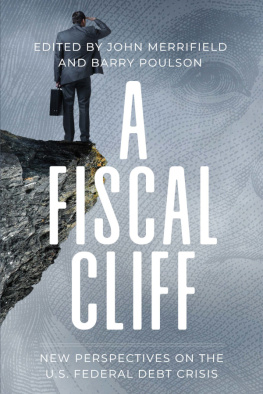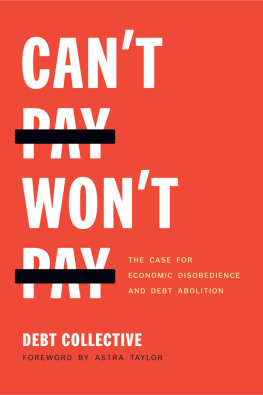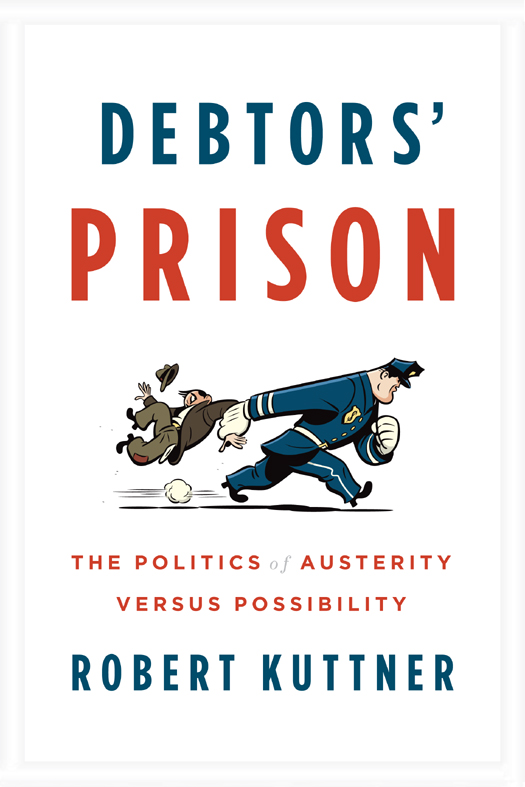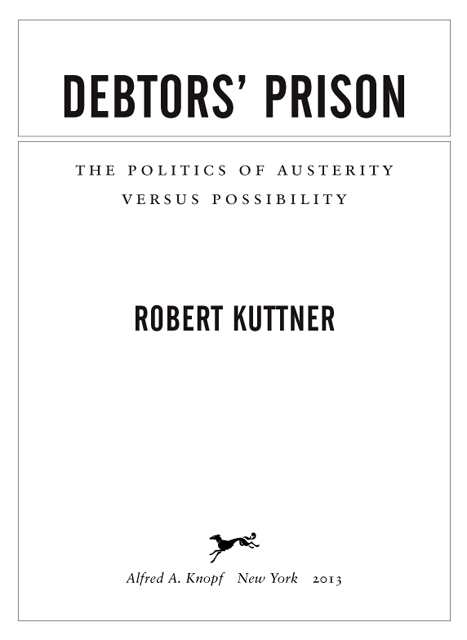ALSO BY ROBERT KUTTNER
A Presidency in Peril:
The Inside Story of Obamas Promise, Wall Streets Power and the Struggle to Control Our Economic Future
Obamas Challenge:
Americas Economic Crisis and the Power of a Transformative Presidency
The Squandering of America:
How the Failure of Our Politics Undermines Our Prosperity
Everything for Sale:
The Virtues and Limits of Markets
The End of Laissez-Faire:
National Purpose and the Global Economy After the Cold War
The Life of the Party:
Democratic Prospects in 1988 and Beyond
The Economic Illusion:
False Choices Between Prosperity and Social Justice
Revolt of the Haves:
Tax Rebellions and Hard Times
THIS IS A BORZOI BOOK
PUBLISHED BY ALFRED A. KNOPF
Copyright 2013 by Robert Kuttner
All rights reserved. Published in the United States by Alfred A. Knopf,
a division of Random House, Inc., New York, and in Canada by Random House of Canada Limited, Toronto.
www.aaknopf.com
Knopf, Borzoi Books, and the colophon are registered trademarks of Random House, Inc.
eBook ISBN: 978-0-307-95981-2
Hardcover ISBN: 978-0-307-95980-5
Library of Congress Cataloging-in-Publication Data
Kuttner, Robert.
Debtors prison : the politics of austerity versus possibility / Robert Kuttner.
p. cm.
ISBN 978-0-307-95980-5 (hardback)
1. Debt. 2. Budget deficits. 3. Government spending policy. 4. Consumption (Economics) I. Title.
HG 3701. K 88 2013 339.52dc23 2012036230
Cover illustration by Mark Matcho
Cover design by Evan Gaffney
Manufactured in the United States of America
First Edition
v3.1
For Joan
I will have my bond.
Shylock, in William Shakespeares
The Merchant of Venice
Contents
Introduction
ON OCTOBER 29, 1692,DANIEL DEFOE , merchant, pamphleteer, and future best-selling author of Robinson Crusoe, was committed to Kings Bench Prison in London because he owed more than 17,000 pounds and could not pay his debts. Before Defoe was declared bankrupt, he had pursued such far-flung ventures as underwriting marine insurance, importing wine from Portugal, buying a diving bell used to search for buried treasure, and investing in some seventy civet cats, whose musk secretions were prized for the manufacture of perfume.
In that era, there was no Marshalsea Prison, on the south bank of the Thames, a parliamentary committee reported in 1729 that some three hundred inmates had died in a three-month period, mainly of starvation.
Typically, creditors obtained a writ of seizure of the debtors assets. (Historians record that Defoes civet cats were rounded up by the sheriffs men.) If the assets were insufficient to settle the debt, another writ would send the bankrupt to prison, from which he could win release only by coming to terms with his creditors. Defoe had no fewer than 140 creditors, but he managed to negotiate his freedom in February 1693, though he would continue to evade debt collectors for the next fifteen years. His misadventures later informed Robinson Crusoe (1719), whose fictional protagonist faces financial ruin and expresses remorse of all my own miseries.
The banking system of seventeenth-century England was rudimentary. Easy credit was broadly available to the merchant class, and it financed Englands commercial expansion. As we may recall from Shakespeares Merchant of Venice (set in Italy but depicting English commercial practice around 1600), traders typically got credit not from banks but from one another. If a merchant was ruined by foolish optimism or bad luck (as the eponymous merchant, Antonio, was when his ships were presumed lost), he would be unable to repay his guarantor (Bassanio), known as a surety, who was often ruined in turn. At the end of this chain was the moneylender (in this instance, Shylock), who might also face insolvency (or, in Shylocks case, retribution). In a general downturn, the system imploded, and large segments of the merchant class ended up in jail, further contracting the supply of credit and worsening the slump.
Thus did the primitive credit system reinforce the cycle of booms and busts. The chartering of the financial system is still, in modern economic parlance, pro-cyclical. In a boom, financial engineering underwrites euphoria. In a downturn, credit contracts. Harsh treatment of debt and debtors only exacerbates the general deflation.
In late seventeenth-century England, the commercial class came to appreciate that jailing bankrupts was self-defeating. As the legal historian Chapter 11 of the modern U.S. bankruptcy code, the provision that allows an insolvent corporation to write off old debts under the supervision of a judge and enjoy a fresh start as a going concern.
contrasting the infortunate Marchant, whose estate is swallowed by the mercilesse Seas with the wily politick bankrupt who deliberately seeks to defraud his creditors. But the first critic to successfully alter the Crowns policy was Daniel Defoe.
Reflecting on his own bitter experience, Defoe became Englands leading crusader for bankruptcy reform. In 1697, he published the book-length Essay upon Projects, in which he proposed a novel solution. Rather than throwing the debtor to the mercy of his creditors, a Court of Inquiries could make an assessment of the bankrupts assets, allocate them to creditors at so many pence in the pound, and leave the debtor with enough money to carry on his business. This legal action, undertaken with the cooperation of the debtor, would result in the full was confined in prison both he and the creditor lost through his prolonged distress.
Fortuitously, London in the 1690s was dealing with the aftermath of both bubonic plague and commercial losses due to the recent wars with France. Debtors prisons were overflowing not only with sundry speculators and deadbeats but with solid businessmen whose enterprises had been ruined by the eras economic dislocations. A terrible storm in November 1703 that devastated merchant shipping added to the economic misery. In 1705, with the support of Queen Annes ministers, Parliament took up a bankruptcy reform act, introducing for the first time the concept of discharge.
Defoes thrice-weekly newspaper, A Review of the State of the English Nation, reported on the progress of the bill and served as its most authoritative advocate. The government, looking to drum up support, purchased and distributed copies, increasing its paid circulation to fifteen hundred. The act was understood as an emergency measure to restore commerce; it was to remain in force for just three years.
The legislation drew two key distinctions. It differentiated between honest bankrupts who were victims of financial circumstances beyond their control and perpetrators of fraud, who were to be treated as criminals. The act, moreover, was aimed at providing relief for merchants. Ordinary bankrupts, fraudulent or just unlucky, stayed in prison.
The new law, enacted in 1706 after extensive debate, fell far short of what Defoe had urged. It required the consent of four-fifths of a bankrupts creditors before a certificate of discharge could be issued. The law was written primarily to protect creditors, not debtors. Ironically, though his pamphleteering had inspired the reform, Defoe could not qualify, and he temporarily fled to Scotland. Nonetheless, an important conceptual breakthrough had occurred.












